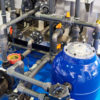Selecting the correct commercial pool heater size isn’t just a technical decision – it directly affects water temperature consistency, energy bills, and swimmer satisfaction. Whether you manage a hotel, fitness center, or swim school, understanding proper commercial pool heater sizing is essential for smooth operations and long-term value.
Choosing the Right Size Commercial Pool Heater
Accurate sizing is crucial for more than comfort. A heater that’s too small won’t meet demand, leaving guests with cold water. A unit that’s too large will cycle inefficiently, leading to premature wear and higher operating costs.
Correct sizing improves operational efficiency, reduces energy waste, and extends equipment life. It also lowers the need for repairs caused by overworked systems. When you work with a professional commercial pool service, they’ll help you find the sweet spot between performance and cost.
Understanding Pool Heating Needs
Pool dimensions are only the starting point. You also need to factor in your geographic location – colder climates require more powerful heaters – and the intended use of the pool. For instance, pools used for therapy or swim training may demand higher and more consistent temperatures than recreational ones.
Pool surface area – not just volume – is a major factor in heat loss. A wide, shallow pool loses more heat than a narrow, deep one. High-traffic pools open year-round will also need more heating power than seasonal facilities.
Calculating Heater Size
Commercial pool heater sizing starts with a basic formula:
BTUs required = Pool Surface Area × Temperature Rise × 12
This gives you a rough estimate of the heating power needed. For example, to raise a pool’s temperature by 10°F, the larger the surface area, the more energy you’ll need.
To simplify this process, many online calculators let you input your pool’s size, temperature goals, and climate zone to determine the ideal heater size. Still, it’s wise to verify those results with a licensed pool service specialist.
Comparing Commercial Pool Heating Options
There are four primary types of heaters to consider:
- Gas heaters are powerful and quick, making them ideal for cold climates or high-use pools. However, they come with higher fuel costs.
- Heat pumps are energy efficient but work best in warm or moderate climates.
- Electric heaters are usually reserved for spas or small indoor pools due to their limited capacity.
- Solar heaters are eco-friendly with low operating costs, though they depend heavily on consistent sunlight and require more installation space.
For commercial facilities, gas and heat pump models tend to offer the best balance between power and cost, depending on your region and pool use.
Avoiding Common Heater Sizing Mistakes
One of the biggest mistakes is overestimating heater size “just in case.” While that might sound safe, it often leads to inefficient short cycling, wasted energy, and unnecessary wear. On the flip side, undersized heaters can’t keep up, especially in cooler months or during peak usage. Another common error is ignoring climate or usage patterns. A pool in Texas will have very different heating needs than one in Michigan.
Avoid these pitfalls by working with professionals who understand commercial pool heater sizing and can guide you based on real-world data, not just formulas.
Installation and Maintenance of Commercial Pool Heaters
A correctly sized heater still needs proper installation and routine upkeep. Placement should allow for good airflow, accessibility, and protection from the elements. Skimping on installation could reduce performance or even void warranties.
Once installed, regular maintenance is key to keeping your system running efficiently. Tasks like inspecting burners, checking for leaks, and flushing the heat exchanger should be done routinely. A trusted pool service company can schedule seasonal maintenance and inspections to catch small issues before they lead to major commercial pool repair.
Making the Right Heating Choice
Proper commercial pool heater sizing is not a one-size-fits-all decision – pool size, usage, and location all play major roles. When done right, it improves performance, lowers energy bills, and prevents costly downtime. For facility managers looking to protect their investment, working with an experienced swimming pool service company is the best way to get heating right the first time.



